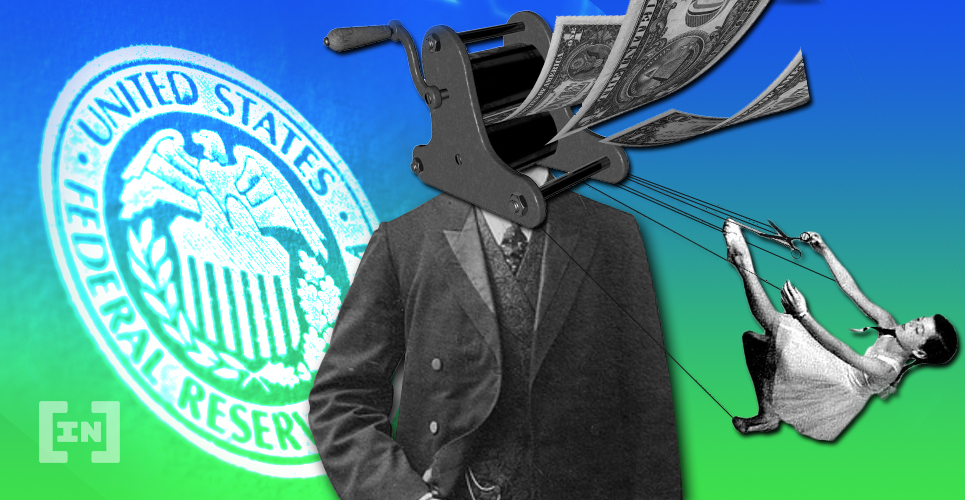[ad_1]
Social Capital’s CEO recently told CNBC that the richest people in the United States shouldn’t get a taxpayer bailout. Instead, like everyone else, they should suffer the consequences.
The US Economic Law passed last month was announced as a “balance” to achieve daily support for Americans, small businesses, and businesses. However, the tireless printing of money by the Federal Reserve tells a different story. One that is about boosting financial markets and supporting large companies seems to be their first priority.
The risk of prioritizing larger companies is that Americans have little or no purchasing power. Of course, this will only exacerbate the blow caused by the economic crisis. This was the case that Chamath Palihapitiya, CEO of Social Capital, recently drew attention to CNBC in a very strong language.

“Let them annihilate themselves”
Chamath Palihapitiya, CEO of Social Capital, recently looked at CNBC, arguing that excessive concern about how wealthier companies and Americans would fare in this crisis is wrong.
Who cares? Let them go. Expressed.
The United States According to Chamath Palihapitiya, CEO of Social Capital, billionaires and hedge funds should not be saved during the coronavirus pandemic. Who cares? Let them be wiped out. “Https://t.co/dIbizumtqG pic.twitter.com/u8BSVvr0B1
– CNBC (@CNBC) April 9, 2020
The comment went viral and the Americans seemed to agree.
Let’s go … bailout for everyone … but YOU, the guy on the main street who followed the rules, invested in their 401Ks and HELP when the market fell … you should have known better … you get watered down and wiped out.
– MRKD26 (@ MRKD26) April 9, 2020
Palihapitiya emphasized that there was “a lie immortalized by Wall Street”, indicating that if a company fails, it will necessarily lay off all of its workers. In fact, as Palihapitiya argues, most bankruptcies are simply bought back. The people who are really affected are the speculators and those who keep the stocks, and therefore they should be allowed to eliminate them.
According to Palihapitiya, these people and entities do not deserve support. It’s not them that keep the economy going, and that’s the business they chose when they decided to be just investors.
Also a bitcoin fan
Palihapitiya’s views are closely linked to the firm belief that no one in the market deserves a favor. It turns out that he firmly believes in Bitcoin.
Social Capital’s CEO said he bought a large amount of Bitcoin in 2013 when it was trading for just $ 80. He claims that he currently has around 5% of all BTC in circulation.
With the financial system looking weaker than ever, Bitcoin could become a safe haven, but it all depends on which way society chooses. For this reason, Palihapitiya claims that “there is zero or there are millions”. [Forbes]
However, he hasn’t suggested Bitcoin to do this immediately if this economic crisis worsens. In fact, it remains an extremely speculative investment that will swing even more wildly in this crisis. However, if Palihapitiya’s vision is correct, there is a possibility that there is light at the end of the tunnel.
Do you use telegram? Join the Telegram trading community to get exclusive buy and sell signals for cryptocurrencies, educational content, discussions and project analysis!
Join the Cryptocurrency group on Facebook to comment on the latest news, share the best blockchain projects and trading signals, and win the market
Disclaimer of liability. Read moreRead less
As a leading blockchain and fintech news company, BeInCrypto always strives to comply with strict editorial guidelines and the highest journalistic standards. With this in mind, we always encourage and encourage readers to do their own research into the information contained in this article. This article is intended as news and is for informational purposes only. The topic of the article and the information provided may have an impact on the value of a digital or cryptocurrency asset, but is never intended. Likewise, the content of the article and the information contained therein do not intend to present sufficient information to make a financial or investment decision. This article is not expressly intended as financial advice, it is not financial advice and should not be construed as financial advice. The content and information in this article have not been prepared by a certified financial professional. All readers should always conduct their own due diligence with a certified financial professional before making an investment decision. The author of this article may have any amount of Bitcoin, cryptocurrencies, other digital currencies, or financial instruments at the time of writing, including but not limited to those contained in the content of this article.
[ad_2]


Add Comment